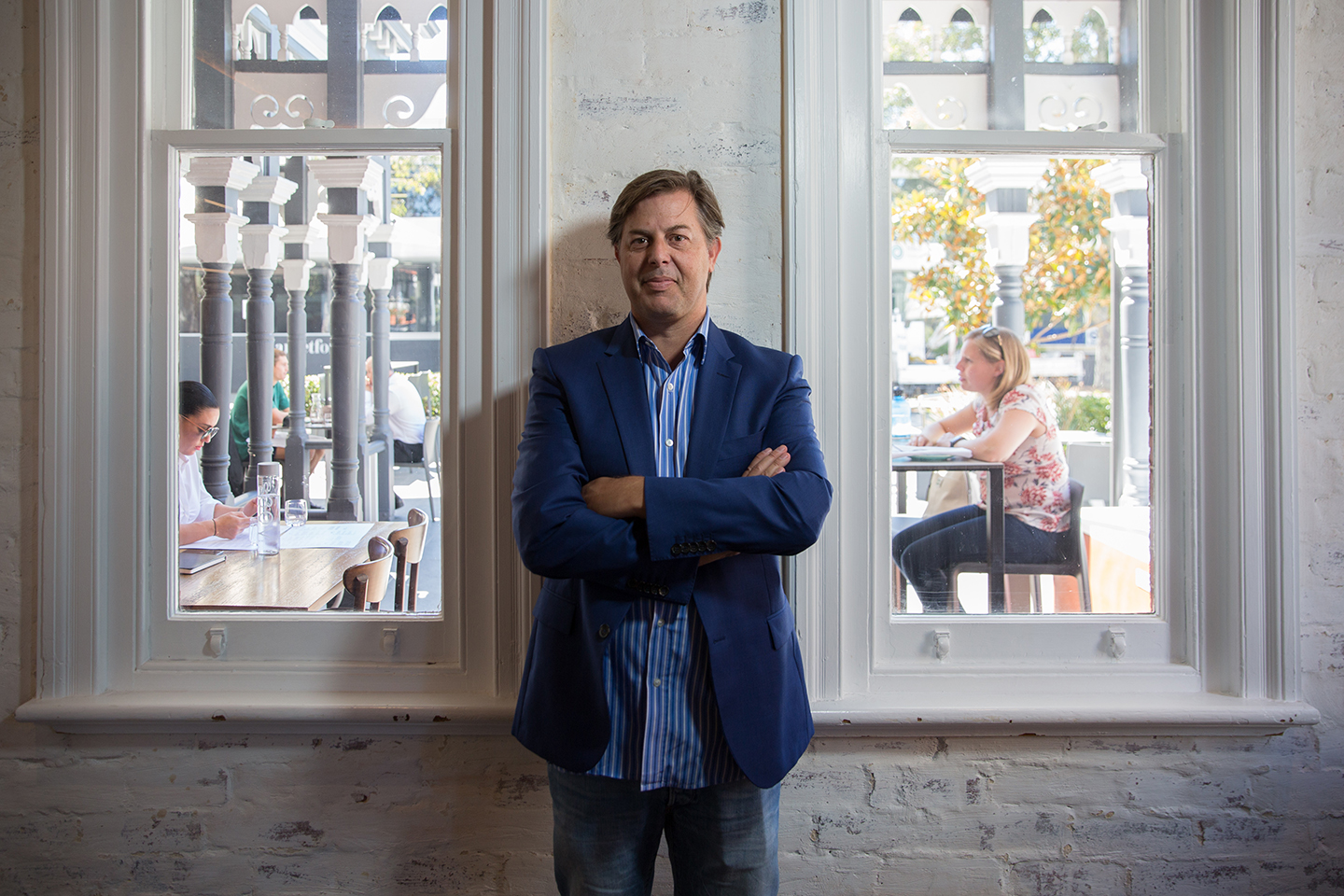A survivor of the tech wreck, Andrew Hall tasted success in the venture capital space before launching his own new startup, Formalytics.


A graduate of Bunbury Cathedral Grammar, Andrew Hall admits he was hardly a model student when he started a science degree in the early 1990s at the University of Western Australia.
“It was quite a lazy first degree,” Mr Hall said.
“I spent most of my time running around training for triathlons.”
Despite a commitment to the sport that earned him a state junior title, a budding scientist managed to emerge and he headed to the University of British Columbia in Canada on a post-graduate exchange program, which also included time at Wageningen University in the Netherlands.
“That’s where I really became a serious academic and started doing a lot of epidemiology, which is effectively the study of the distribution and determinates of diseases in the human population,” Mr Hall said.
He did a masters degree and then embarked on a PhD, opting to stay in Vancouver as the 1990s came to a close.
“It was during that 1999-2000 period where I really got bitten by the dotcom boom,” Mr Hall told Business News.
“It was all happening. Vancouver wasn’t as energetic as what was going on in Seattle or San Francisco at the time, but it certainly had quite a scene.
“That’s where my first startup came from, a thing called liftpasses.com.
“Being in the epicentre of the skiing industry out in Vancouver, we decided it was a good idea to take the ticketing from physical tickets to using WAP technologies on mobile phones at the time.
“About six or seven of us got together and all put our university degrees on hold, and we moved into a very big house, which was the falling down, double A-frame next to Imelda Marcos’s house in Vancouver on the beach.
“It was the most extraordinary time. Everything was heaving and we gave it a crack.
“Obviously had no idea what we were doing, and we rode it up, raised a couple hundred thousand (dollars) in seed.
“Then once we had finished the product, we were off to raise a series A.”
Mr Hall said it was at this time he learned his first big investment lesson in the volatile technology startup scene, as the dotcom crash wiped out the market in a matter of months.
“For us it was quite incredible to see, because we kept going back to Seattle to talk to these investors, but these investors started to disappear … incubators would close down, there were tumbleweeds blowing through,” he said.
Despite the dramatic collapse of tech stocks across the world and the end of his initial business hopes, Mr Hall said he had caught the bug and, while continuing to study, hunted for a job in Australia, finding work with a firm based in Perth.
“I peppered every VC firm around Australia to see whether they’d give me an internship or actually take me on to do some analyst work for them,” he said.
“I was lucky enough to meet Ian Murchison and Rob Newman through Foundation Capital at the time.
“That’s where it really started for me.
“I got to see first hand how the big deals were done, and learn from those guys, who had done it all before.
“It was a fantastic opportunity, and I spent the next two or three years effectively riding on their coat tails, trying to understand how the world of venture capital worked, and what it took to grow a successful company.
“That was a really good learning ground for me.”
Mr Hall then left the venture capital world for another startup, Clinical Cell Culture, the vehicle commercialising the spray-on skin research work of surgeon Fiona Wood.
After that he ended up being recruited to run a federal innovation and technology commercialisation franchise called Comet, based in Melbourne.
“I had a wonderful ride from about 2005-08 where I was literally doing all the venture grade deals on that side,” Mr Hall said.
In that role he had a commission, which was 2 per cent of the capital raised.
“I generally offered to reinvest it in the company. I’ve had some good ones and some bad ones.
“In fact, I missed one; my claim to fame is Catapult when they were very young, which went on to have a market cap of $1 billion. I decided it was better to take the cash. So there you go.”
Now ASX listed, Catapult Group International is best known for its athlete tracking technology and is a global market leader in sports analytics.
“I think at that stage, I was probably pretty focused on the funds, but also being a former sort of pro athlete, I didn’t quite get what they were doing,” Mr Hall said.
“They certainly turned that around about eight months after that.”
“At the time they had something the size of a matchbox, which was a sensor that could measure movement. They were going into rowing. Small market right?”
Mr Hall uses the example to show that, no matter how much you know about something, picking winners is hard.
“I think that’s a little lesson, that you can’t make your investment decision on what’s happening today. It’s generally going to play out over five to 10 years,” he said.
“Good people make a deal work in most circumstances is what I’ve learned.”
In 2009, Mr Hall joined Rob Newman’s investment manager Stone Ridge Ventures, which included key players in the technology sector such as Matt Callahan and Kath Giles.
At Stone Ridge, he took a manager role he saw as part of a systematic progression from finding deals, analysing deals (as he had in the past), to rolling his sleeves up to help build some value.
The role was, in effect, to try to identify a good entrepreneur, a secret sauce he said he still hadn’t bottled.
“I think I’m still learning,” Mr Hall said.
“I think they (entrepreneurs) have got to have some affinity for the market they’re in.
“They’ve got to have a tremendous amount of grit, because it’s definitely an up-and-down ride.
“The best quote I’ve heard is it’s the best job in the world and the worst job in the world sometimes.”
Mr Hall’s journey after Stone Ridge included running a business called Bright Generation, which was seeking to capitalise on the early solar boom in Australia with a combined thermal and photovoltaic device, which took him to the direct consumer market for the first time.
After Bright was sold, Mr Hall became an adviser to the Australian Renewable Energy Agency, a $3.2 billion fund set up by federal Labor, to help manage an investment with Southern Cross Venture Partners, a $200 million fund that wanted to convince miners to use renewable energy.
Having finished his stint at Arena, he ended up helping a deal that many in Western Australia will know – convincing fledgling Sandfire Resources to adopt renewable power.
After a period mixing it with the likes of Sandfire’s Karl Simich, Mr Hall decided to step out on his own again. He ran the local chapter of accelerator the Founder Institute, helping young digital entrepreneurs get market-ready.
“I learned more than I ever could about what digital models work well, and out of that came where I am today, which is Formalytics, a business which grew from an initial approach by fruit and vegetable distributor Grant Etherington to develop a business idea,” Mr Hall said.
“I still do the Founder Institute, as my give-back to the community, but it’s certainly shaped the direction I’m at today.”
Formalytics allows mobile phone users to track the power and trajectory of a ball – at this stage a shot at goal in soccer – based on the Hawk-Eye technology used in professional tennis.
“We’ve started off in the world’s largest sport, which is football (soccer),” Mr Hall said.
“It’s really enabling kids age 13 to 18 to basically use their iPhone as a voice-activated device, where they can call out a word, and it films their kicks, and on the device we run a very deep computer vision algorithm.”
Like many technologies, the original purpose (a training aid) has been somewhat left behind by consumer adoption for a different outcome.
Players are using the app to compete against each other and Formalytics has plans to capitalise on this for the soccer world cup.
“It’s been quite a journey. Formalytics has raised about $2 million from the local technology investment community, and they’ve been great in supporting us,” Mr Hall said.
“We’re now really at the starting line. We’re about to go a lot faster on something we’ve done a lot of in user testing, and we’re pretty excited. Our moment of truth is coming.”












